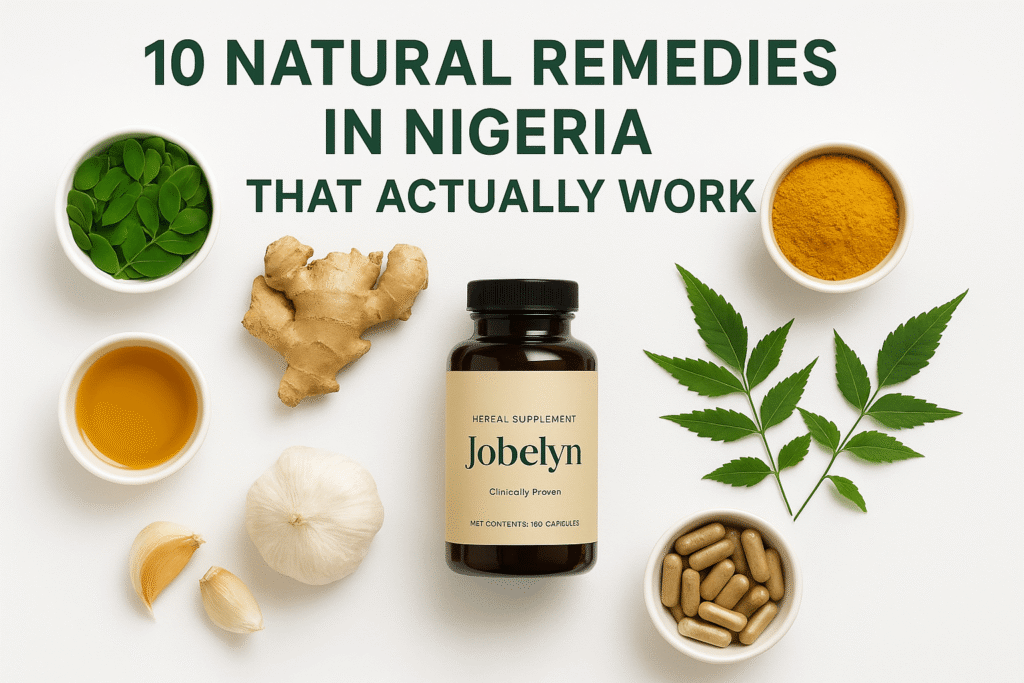
10 Natural Remedies in Nigeria That Actually Work for Everyday Health (Including Jobelyn)
In a world where synthetic drugs and quick fixes dominate the health space, more Nigerians are rediscovering the power of nature’s pharmacy — our indigenous herbs and plants that have been used for centuries. As a certified health and wellness advocate, I have seen firsthand how natural remedies can transform everyday health — not just as supplements, but as true healing agents.
If you’re searching for natural ways to improve immunity, energy, digestion, and general well-being, these ten Nigerian natural remedies are worth knowing. Let’s dive deep into each one and explore why they actually work — with scientific backing and centuries of tradition.
1. Jobelyn (Sorghum bicolor) – The Immune Powerhouse
Jobelyn is one of Nigeria’s most researched natural health products — a super antioxidant supplement derived from Sorghum bicolor, a species of African millet. This powerful herbal formula is known for supporting blood health, boosting the immune system, and fighting inflammation.
Clinical studies have shown that Jobelyn helps increase red blood cell production and supports individuals battling fatigue, anemia, and low immunity. It’s also widely used as a natural energy booster for people recovering from illness or stress.
How to use:
Take Jobelyn capsules or powder as directed on the packaging — usually one to two capsules twice daily after meals.
2. Moringa – The Tree of Life
Moringa oleifera, often called the “Tree of Life,” is a miracle plant rich in vitamins A, C, E, calcium, and protein. Every part — the leaves, seeds, and pods — offers healing benefits. Moringa supports immune function, reduces blood sugar, and promotes healthy digestion.
It’s perfect for people seeking a natural multivitamin without side effects.
How to use:
Add moringa leaf powder to smoothies, pap, or tea. A teaspoon daily is enough for general wellness.
3. Bitter Leaf – Detox and Digestive Support
Known in Yoruba as Ewuro, Bitter Leaf is more than just a vegetable. It’s a detoxifying herb that cleanses the liver, supports digestion, and helps reduce blood sugar. Bitter leaf juice is commonly used to manage malaria symptoms, fever, and fatigue.
How to use:
Blend fresh bitter leaves with a little water, strain, and drink half a cup of the juice once or twice weekly. You can also cook it in soups for nutritional benefits.
4. Ginger – The Natural Anti-Inflammatory Root
Ginger (Zingiber officinale) is one of the most versatile roots used in Nigerian households. Beyond its spicy taste, ginger helps with nausea, joint pain, menstrual cramps, and respiratory congestion. It contains compounds called gingerols that fight inflammation and improve circulation.
How to use:
Boil fresh ginger slices in hot water for 10 minutes and drink as tea. You can also mix ginger powder into meals or smoothies.
5. Turmeric – The Golden Healer
Turmeric is another powerful anti-inflammatory herb containing curcumin — known for fighting free radicals and promoting heart and joint health. Many Nigerians now combine turmeric and ginger as a natural pain relief tea.
How to use:
Mix one teaspoon of turmeric powder in warm water or milk. Add black pepper to enhance absorption.
6. Garlic – The Natural Antibiotic
Garlic (Allium sativum) has been used as a natural antibiotic for generations. It’s rich in sulfur compounds that fight infections, improve cholesterol levels, and boost heart health. Nigerians commonly chew raw garlic for cold, cough, and flu symptoms.
How to use:
Crush 1–2 cloves of raw garlic and swallow with warm water. You can also cook it lightly to retain its medicinal properties.
7. Aloe Vera – The Skin and Digestive Healer
Aloe vera is known for its soothing gel that promotes skin healing and improves digestion. Nigerians use aloe for wounds, burns, and constipation. Its internal gel cleanses the gut and supports nutrient absorption.
How to use:
Drink 2 tablespoons of aloe vera gel mixed with a glass of water once daily, or apply the gel directly to the skin for burns and acne.
8. Scent Leaf – Nigeria’s Antimicrobial Herb
Scent leaf (Ocimum gratissimum), known as Efirin in Yoruba, is another potent medicinal herb. It helps fight infections, promote heart health, and relieve stomach upset. Its natural antimicrobial properties make it an excellent remedy for common colds and respiratory problems.
How to use:
Boil scent leaves in water, allow to cool, and drink as tea, or use it as a spice in soups and stews.
9. Neem (Dogonyaro) – The Natural Cleanser
Neem is often referred to as the “wonder leaf” for its detoxifying effects. It purifies the blood, clears skin issues, and boosts immunity. Traditional healers use neem leaves to treat malaria and skin rashes.
How to use:
Boil neem leaves for 10–15 minutes and drink the water. Because of its bitterness, you can mix it with honey.
10. Lemongrass – The Stress-Relieving Tea
Lemongrass (Cymbopogon citratus) is popular in Nigerian wellness circles for its calming, antibacterial, and digestive benefits. It relieves stress, anxiety, and bloating — making it perfect for evening tea.
How to use:
Boil a handful of lemongrass leaves and drink as tea daily for relaxation and immune support.
Final Thoughts: Embracing Natural Healing in Everyday Life
Nigeria is blessed with countless natural remedies that work — and science is gradually catching up with what our ancestors already knew. From Jobelyn’s immune-boosting powers to moringa’s nutritional richness, and the soothing effects of aloe vera and scent leaf, these remedies can enhance daily health when used consistently.
However, always remember:
Natural doesn’t mean careless. Consult a qualified health professional if you’re managing a chronic condition, on medication, or unsure about dosage.
When used wisely, these natural remedies can help you live stronger, longer, and healthier — just as nature intended.